Nothing can stop Roberta Morgan. Not even her husband Jimmy, who has suggested that she might want to pull the car over. It’s early July, early morning and the Morgans are driving down-Island for their daily coffee klatch at Humphrey’s in Vineyard Haven. The sky is nearly black and it’s pouring. Other cars have pulled to the side of North Road to wait for the squall to pass. But Berta, as she is known to most, continues driving, albeit at a snail’s pace. She wonders aloud if it will rain all day. “No one comes in if it is raining,” she says, speaking about her store, The Harbor Craft Shop in Menemsha. “Oh this will pass,” her husband says, and the words carry the weight and authority of a legendary retired fisherman and boat captain.
Soon the Morgans are inside Humphrey’s, two coffees and a plain doughnut to share, at a table with their regular crowd: Rosalie Bernard, Ralph Smith and Jim Ciciora. Everyone at the table has a long history with each other. Rosalie and Berta grew up around the corner from one another in Vineyard Haven, where Roberta’s father, Albert W. Allen, was a foreman in the shipyard and also served as the Vineyard Haven harbor master. “He couldn’t swim a stroke,” Jimmy says.
Roberta pats him on the arm and smiles “My father came down from Nova Scotia in the twenties,” she says. “Jimmy knows more about it than I do.”
Jimmy nods. “The only one you can believe at this table is me. But when talking to an old man — I’m 91 — you should always check your facts.”
He returns to the story. “Roberta’s father sailed down from Nova Scotia on a Tern schooner, which is a schooner with three masts — though some of them have four. This was before the Cape Cod Canal. If the tide was wrong or the weather was bad, the boats would stop here and wait it out. Albert came and stayed.”
Roberta interrupts: “Well after he married my mom, they went back up to Nova Scotia for a while. But my mom wanted to come back. Fox River was bleak.”
Jimmy continues: “That’s why you should never marry an Island girl. They always want to come back. My mom was from Lochee, Scotland, which is near the city of Dundee. My father’s family has been here a long time. They came some time around the late 1700s. My great-grandfather was Moses West. He married a Fisher and they had 11 daughters. So, I’m related to a lot of families here — all the Fishers in Edgartown. But my family lived in Menemsha. My father, Clarence Morgan, lobstered, worked for the town, built stone walls and chopped wood.”
Rosalie, who has not only lived this history but heard it many times, wonders if Roberta is going to the Mens and Ladies, a luncheon put on by the council on aging. Roberta says she will, but will not be doing bingo night on Mondays anymore. The last time she went, Roberta called bingo and someone else collected because they did not hear her. Roberta protested and had to share the winnings.
Speaking of money, Jimmy says: “Can you believe that fluke is now five dollars a pound?”
Half an hour later, everyone has caught up, the skies are clearing and Roberta wants to head back to Menemsha to open up the shop.
Jimmy and Roberta met when she was 18. “Bjarne Larsen invited me bowling with his friend Jimmy,” she recalls. “I asked my sister Dorothy if she could come, but she had other plans. I thought, I’m not going bowling with two boys. But I did. We had fun. The place on Beach Road. Right next to where the Art Cliff diner is.”
She tugs on her T-shirt and adjusts a large, gold necklace made for her by Nettie Kent, her grandson Colin’s wife and a well-known artist and jewelry maker. Jimmy’s sharp blue eyes peek out from under his Mystic Seaport Hat.
The bowling date was in 1949.
“And we got married in 1950,” he says.
Roberta pulls up to the store and helps Jimmy out of the car. They move slowly together, Jimmy leaning on a cane, Roberta, who is 85, running a hand through cropped white hair, headed for the shady back porch of the shop where Jimmy likes to sit while she works.
Beyond the usual T-shirts and sweatshirts, The Harbor Craft Shop is filled with Roberta’s creations — her own beach plum jelly, and charming aprons, dresses, pillows and potholders that she has sewn. Daughter Barbara’s photographs are for sale along with seascapes painted by Roberta and Jimmy. “He draws. Then I paint them. He tells me what colors he thinks will work,” Roberta says.
Jimmy shrugs. “I drew a little bit in school. I don’t know. When I sold the Mary and Verna [his fishing boat] when I was 80, I needed to do something.”
Decades before land speculation and vacation rentals were big business, Jimmy’s mother Mary Douglas Morgan bought the land where the Harbor Craft shop sits, along with four houses on the hill next to it. Today their daughter Barbara lives in one home and owns two others, while son Jimmy owns the shop and the home that Jimmy and Roberta live in. “I don’t own anything anymore. I have given it all to Barbara and Jimmy,” Jim senior says. He pauses and his eyes well up. “If you can, you do everything you can do to help your family. My mom helped me buy land and build a house. Now I want to help my kids and grandkids.”
In 1953, Jimmy and Roberta bought a small piece of land on Flanders Lane for $1,000 and built a house there.“I built it for an unbelievably expensive $15,000. Our mortgage was $56 a month,” Jimmy recalls. “Once in awhile, we had to borrow $10 a month from my parents so that we could pay the mortgage and eat.”
Roberta adds, “That’s what parents are there for. We always ask, how can I help?”
The house, a charming cottage nestled into a hill, is filled with family photos, books about fishing and boats, Jimmy and Roberta’s art and Jimmy’s boat models.
Down at the shop, Jimmy sits and watches the tourists walk by. The village has changed since he was a boy. In 1942, after graduating from the Tisbury School, he began fishing for Tom Tilton. He said, “We didn’t have radar then. Just a compass, charts, an alarm clock and a false clock. We navigated by time traveled and depth.”
He explains: “We would set the time when we left the harbor and traveled one hour in a direction to a particular buoy, say one hour south to a buoy off of Noman’s Land. Then we’d reset the clock and set off to the south or southeast for another hour and a half. When we’d get close, we used a sounding lead — a 10-pound weight on a string — to measure the depth.”
Jimmy recalls they would fish until the “wind breezed up” or the boat was full or there was bad weather. If they were fishing near the Island, they would steam back up the sound to unload the fish at Sam Cahoon’s in Woods Hole — where the Steamship Authority is now. If he wasn’t buying, they’d go to New Bedford, Point Judith or even as far as Newport, R.I.
“I never saw Tom Tilton look at a chart,” Jim says.
After a year of fishing, Jimmy joined the Merchant Marine and did four trips across the Atlantic, traveling to England, Scotland and Antwerp, Belgium. In 1945, when he returned, he began swordfishing with the Larsens — Louis Larsen and his brothers, Bjarne and Dagbard (Deba) — aboard the Christine and Dan. “It was a great industry in those days. The fishing business employed a lot of men. All new dollars were coming to the Island. We’d go to Georges Bank for two weeks and fill the boat. On our best trip, we had 100 swordfish in the hole and 16 more on deck. We were pretty low in the water. We made good money. Deba was an amazing striker, he hardly ever missed a fish. My accuracy was not as good. I’ve only harpooned maybe 100 in my life.”
In 1975, Jimmy bought the Mary and Verna, a 46-foot wooden dragger, built by a Rhode Island school teacher and named after his wife and niece. “Very bad luck to rename a boat,” he says.
Jimmy captained and fished the Mary and Verna until he was 80 or 81. “David Merry fished with me longer than anybody. He would come pick me up, we’d go to the boat and head out and not even say a word to each other for the first three or four hours that we’d be together. He just knew what to do.”
He shakes his head. “I miss making boat models; I used to love going down into the cellar, listen to my Irish music. It was my sanctuary.”
Roberta sticks her head out of the shop asks Jimmy if he’s hungry. He says no. She says, “Well, it’s three. I’m going to have Karen make you a fish sandwich,” referring to Karen Flynn at the Bite next door. She laughs, “I never really ate fish until I married him.”
Jimmy waits for his lunch and more memories tumble out. “I was on Georges Bank when Barbara was born. I called in — we could call once a week to check in — and learned that I was a dad. Can you imagine doing that these days?” His eyes well up again. “Barbara is like me. She’s emotional,” he says. “Roberta was everything when I was away. She was the mother, doctor, teacher.” A pause, and then, “We’ve had a great life here.”
Morgans by the Numbers
Ages: James (Jimmy), 91; Roberta (Berta), 85.
Children: Barbara Armstrong and her husband John Armstrong and James (Jimmy) Morgan and his wife Diane Morgan.
Grandchildren: Colin Ruel, Patrick Ruel, Lily Morgan, Alastair Morgan
Great-grandchild: Asa Allen Ruel (son of Patrick Ruel and Bea Whiting).
Live in: Menemsha (Jimmy since birth, Roberta since 1950).
Pets: None.
Roberta’s favorite restaurant: Linda Jean’s.
Jimmy’s favorite music: The Clancy Brothers and Tommy Makem.

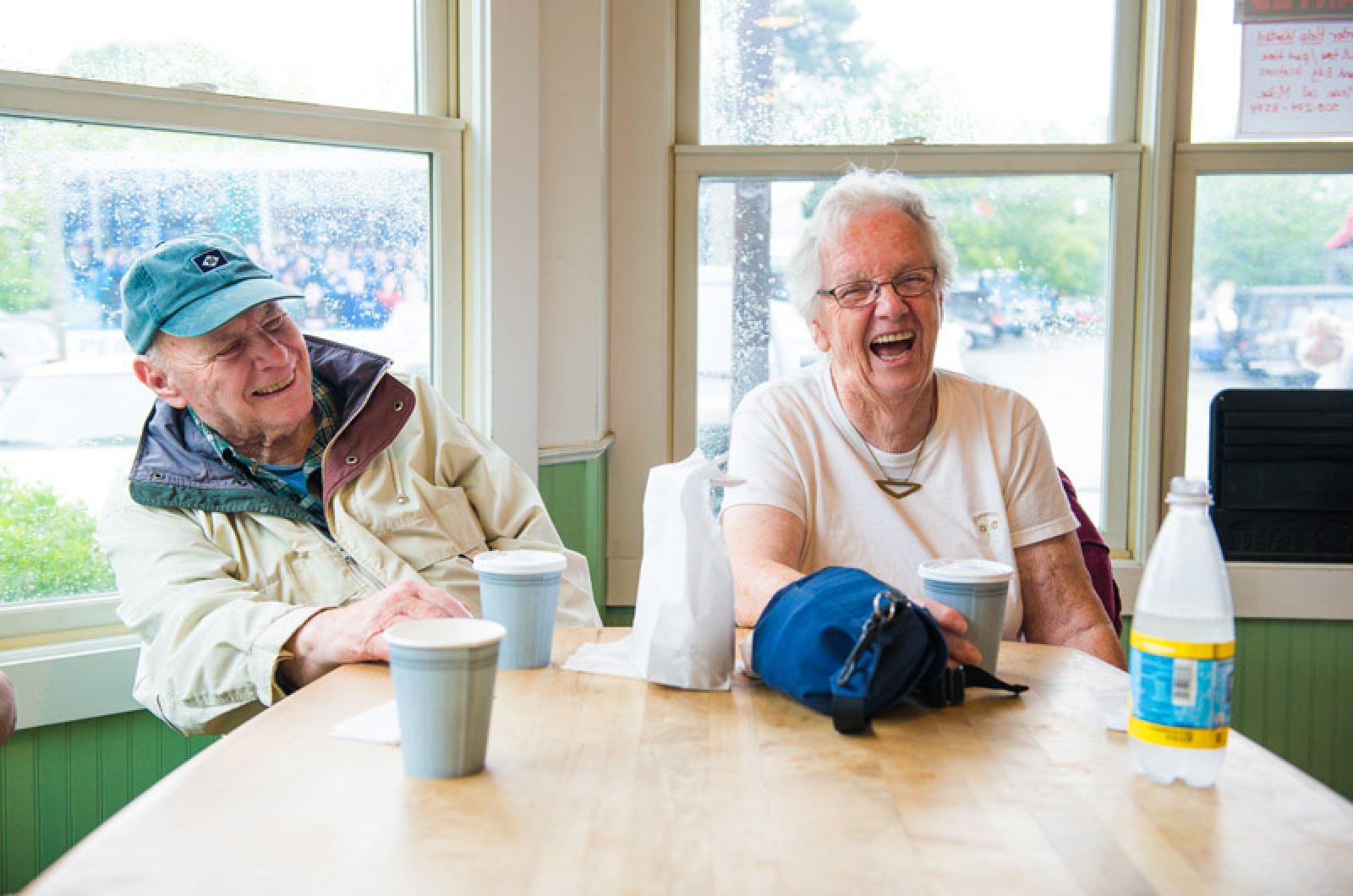
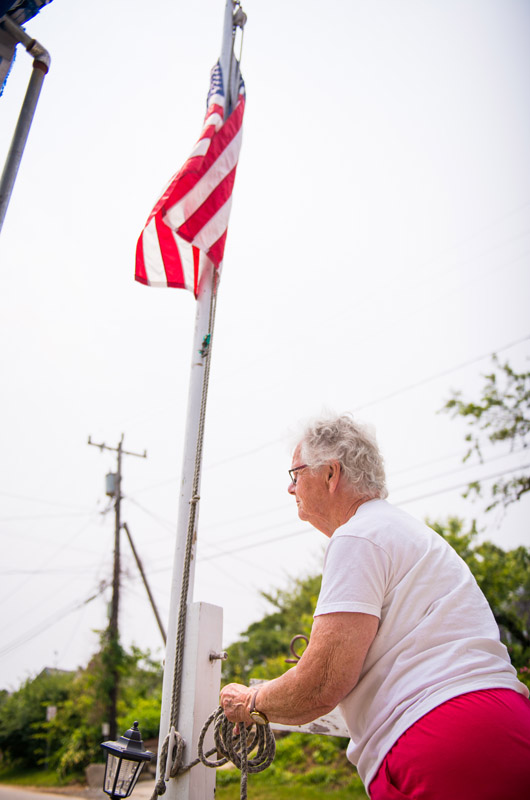

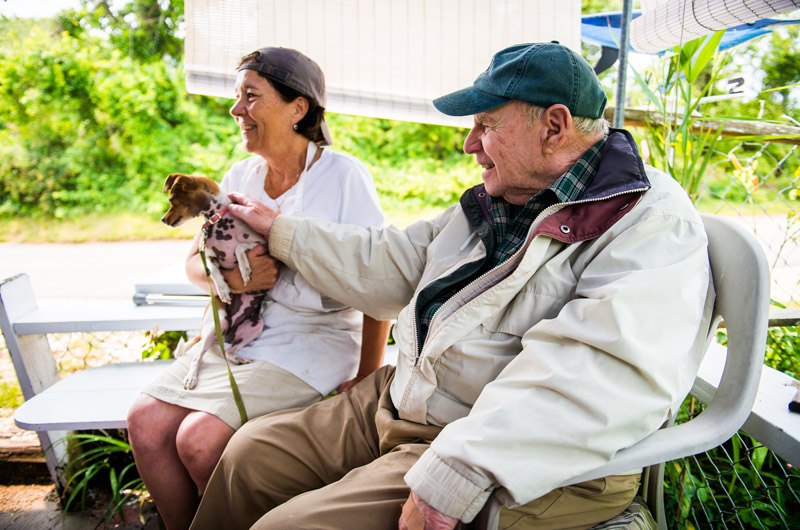
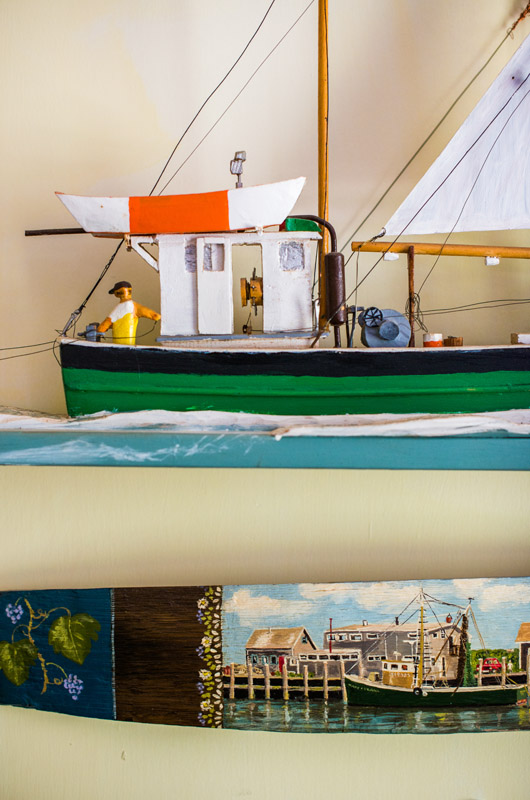
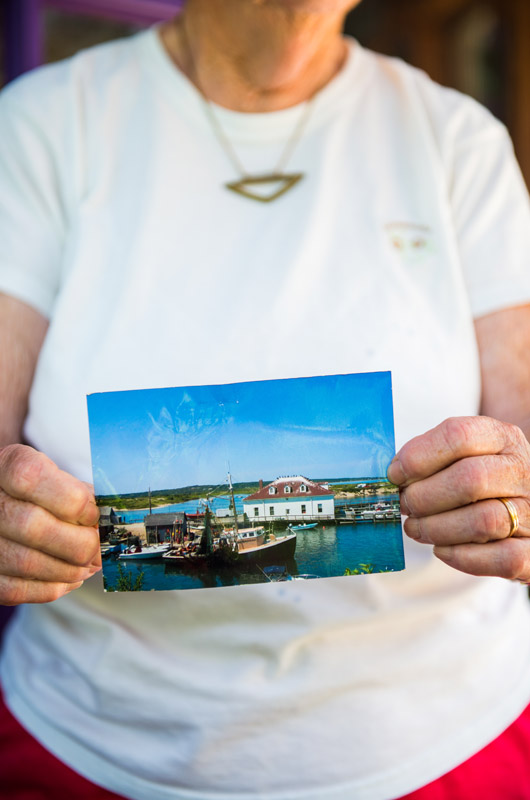





Comments (20)
Comments
Comment policy »